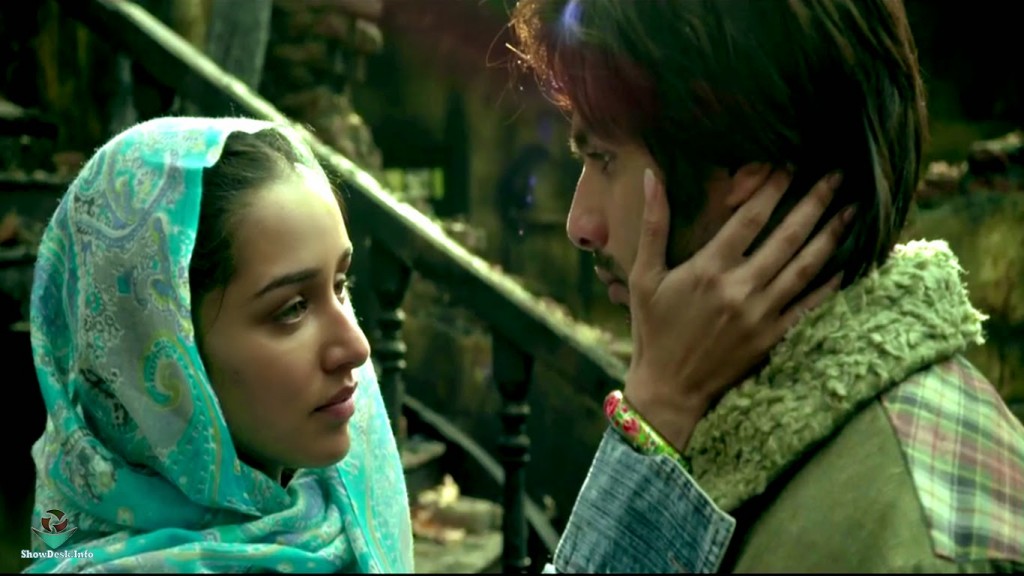1995. When his father, a doctor, is picked up by the Indian army for treating a militant and disappears, his son, Haider (Shahid Kapoor), a student, returns to the Kashmir valley only to find out that his mother Ghazala (Tabu) is cozy with his father’s younger brother, Khurram (Kay Kay Menon), a local political aspirant. One day he receives a message from the mysterious Roohdaar (Irrfan Khan), who informs him that his father is dead and Khurram and Ghazala were behind his capture. His father’s message to him is that he take revenge.
To me, Vishal Bhardwaj’s efforts with adapting Shakespeare are a mixed bag. While he succeeded wonderfully with Maqbool (Macbeth) set in the underworld, Omkara was too contrived an adaptation of Othello for me. Haider, taking off from Hamlet is another disappointment. The film falls in no man’s land as it is neither a strong enough adaptation ofHamlet, and while it does not shy away from some uncomfortable truths of what has happened and is happening in Kashmir, it fails to delve deep enough into the complexities of the issue at hand, and doesn’t quite work in this regard either.
On first thought, Kashmir at the peak of its militant movement would seem to be the ideal backdrop for Hamlet and there are elements that Vishal adapts well – the use of Roohdaar (killed though by the name in case you didn’t get it) rather than the father’s ghost, and a more active flesh and blood Gertrude, for instance. The attention to detail in the production design merits a special mention, as does Pankaj Kumar’s spectacular cinematography. The Oedipal relationship between Ghazala and Haider, one of both intense loving and hating has its moments. But these elements alone do not make for an engaging and yes, thought-provoking film.
The screenplay co-written by journalist Basharat Peer (Curfewed Night: A Frontline Memoir of Life, Love and War in Kashmir) does add a certain authenticity as it draws from Peer’s autobiographical experiences of growing up in Kashmir in the 1990s, and it is an eye-opener, but it also leads to a sluggish, slow-paced, uneven narrative flow, that bites off more than it can chew. The Kashmir issue and Hamlet plot points ultimately do not gel coherently leading to contrivances that are far from convincing. And while the film refuses to absolve the Indian Army of the atrocities it has committed in the name of protecting Kashmir, the tokenism of a single line to the sufferings of Kashmiri Pandits makes the film appear rather one sided. But that really is the filmmaker’s prerogative and he is free to tell the story he wants to tell. After all there are various sides to every story and nothing is quite simple and black and white. The problem with Haider is that the story chosen by Bhardwaj fails to move us or involve us, as one hoped. And then adhering to Hamlet causes inconsistencies. The army is physically present everywhere in the first half and then more or less vanishes in the second. Haider gives his talk in Lal Chowk in front of a full gathering with little or no no army presence.
A bigger problem the film faces is in not knowing how it exactly wants to treat its story in its execution. It jumps from ‘realism’ to theatre to embracing typical Bollywood cliches, especially in its second half that derail the film. Once Hamlet, sorry Haider, begins his mad act, the film sinks and sinks deep. On a surprising note, the film lacks subtlety and is dumbed down like typical Bollywood fare and what’s worse, underlined. The songs, especially in the second half, work as speed breakers, while the loud, continuous backdround score that forebodes what is going to happen doesn’t help either.
The performances too are a mixed bag. Kay Kay Menon and Tabu are efficient enough while Irrfan Khan lifts every scene in the short time he is there on screen. Sadly though, the lead pair Shahid Kapoor and Shraddha Kapoor are weak. The latter looks very pretty but can’t speak even one line of dialogue properly. Speaking of dialogue, the accents are used inconsistently throughout the film and some end up ruining the scene completely – especially those with Shraddha. Shahid is unable to internalize his performance with the internal conflicts of his character and frankly, the complexity of the role was just beyond him. Narendra Jha deserves a special mention as Haider’s father.
You so want to like Haider. Especially since Bhardwaj is a filmmaker who makes films away from the trash of Bollywood. And that’s what makes Haider’s failings even more disappointing. If only it had as much chutzpah as it aimed for.
| Starring |
Shahid Kapoor, Tabu, Kay Kay Menon, Shraddha Kapoor, Narendra Jha, Kulbhushan Kharbanda, Aamir Bashir
|
| Guest Appearance |
Irrfan Khan, Ashish Vidyarthy
|
| Directed by |
Vishal Bhardwaj
|
| Produced by |
Siddharth Roy Kapur, Vishal Bhardwaj
|
| Screenplay by |
Vishal Bhardwaj, Basharat Peer
|
| Dialogue by |
Vishal Bhardwaj
|
| Cinematography by |
Pankaj Kumar
|
| Music by |
Vishal Bhardwaj
|
| Lyrics by |
Gulzar
|
| Sound Design by |
Shajith Koyeri
|
| Production Design by |
Subrata Chakraborty, Amit Ray
|
| Editing by |
Aarif Sheikh
|
| Audiography by |
Sanjay Kurian
|
| Costumes by |
Dolly Ahluwalia
|
Hindi, Drama, Color


